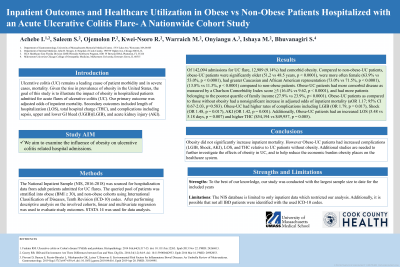Back


Poster Session C - Monday Afternoon
Category: IBD
C0372 - Inpatient Outcomes and Healthcare Utilization in Obese vs Non-Obese Patients Hospitalized with an Acute Ulcerative Colitis Flare - A Nationwide Cohort Study
Monday, October 24, 2022
3:00 PM – 5:00 PM ET
Location: Crown Ballroom

Has Audio

Ikechukwu Achebe, MD
John H. Stroger, Jr. Hospital of Cook County
Presenting Author(s)
Ikechukwu Achebe, MD1, Sania Saleem, MD1, Pius E. Ojemolon, MD1, Robert Kwei-Nsoro, MD1, Muhammad Sheharyar Warraich, MD, MBBS2, Amaka Onyiagu, MD3, Michelle Ishaya, DO1, Supriya Bhuvanagiri, BA4
1John H. Stroger, Jr. Hospital of Cook County, Chicago, IL; 2John H. Stroger Jr. Hospital of Cook County, Chicago, IL; 3HCA East Florida GME Westside/Northwest Internal Medicine, Plantation, FL; 4Midwestern University College of Osteopathic Medicine, Downers Grove, IL
Introduction: Ulcerative colitis (UC) remains a leading cause of patient morbidity and in severe cases, mortality. Given the rise in prevalence of obesity in the United States, the goal of this study is to illustrate the impact of obesity in hospitalized patients admitted for acute flares of ulcerative colitis (UC). Our primary outcome was adjusted odds of inpatient mortality. Secondary outcomes included length of hospitalization (LOS), total hospital charge (THC), and complications including sepsis, upper and lower GI bleed (UGIB)(LGIB), and acute kidney injury (AKI).
Methods: The National Inpatient Sample (NIS, 2016-2018) was sourced for hospitalization data from adult patients admitted for UC flares. The queried pool of patients was stratified into obese (BMI ≥ 30), and non-obese cohorts using International Classification of Diseases, Tenth Revision (ICD-10) codes. After performing descriptive analysis on the involved cohorts, linear and multivariate regression was used to evaluate study outcomes. STATA 14 was used for data analysis.
Results: Of 142,094 admissions for UC flare, 12,989 (9.14%) had comorbid obesity. Compared to non-obese-UC patients, obese-UC patients were significantly older (51.2 vs 48.5 years, p < 0.0001), were more often female (63.9% vs 53.0%, p < 0.0001), had greater Caucasian and African American representation (73.0% vs 71.5%, p < 0.0001), (13.8% vs 11.3%, p < 0.0001) compared to non-obese patients. Obese-UC patients had more comorbid disease as measured by a Charlson Comorbidity Index score ≥3 (16.4% vs 9.62, p < 0.0001), and had more patients belonging to the poorest quartile of family income (27.9% vs 23.9%, p< 0.0001). Obese-UC patients as compared to those without obesity had a nonsignificant increase in adjusted odds of inpatient mortality (aOR 1.17; 95% CI 0.67-2.03, p=0.583). Obese-UC had higher rates of complications including LGIB (OR 1.79, p = 0.017), Shock (OR 1.48, p = 0.017), AKI (OR 1.42, p = 0.001). Additionally, Obese-UC patients had an increased LOS (5.48 vs 5.18 days, p = 0.007) and higher THC ($54,194 vs $49,957, p = 0.005).
Discussion: Obesity did not significantly increase inpatient mortality. However Obese-UC patients had increased complications (LGIB, Shock, AKI), LOS, and THC relative to UC patients without obesity. Additional studies are needed to further investigate the effects of obesity in UC, and to help reduce the economic burden obesity places on the healthcare system.
Disclosures:
Ikechukwu Achebe, MD1, Sania Saleem, MD1, Pius E. Ojemolon, MD1, Robert Kwei-Nsoro, MD1, Muhammad Sheharyar Warraich, MD, MBBS2, Amaka Onyiagu, MD3, Michelle Ishaya, DO1, Supriya Bhuvanagiri, BA4. C0372 - Inpatient Outcomes and Healthcare Utilization in Obese vs Non-Obese Patients Hospitalized with an Acute Ulcerative Colitis Flare - A Nationwide Cohort Study, ACG 2022 Annual Scientific Meeting Abstracts. Charlotte, NC: American College of Gastroenterology.
1John H. Stroger, Jr. Hospital of Cook County, Chicago, IL; 2John H. Stroger Jr. Hospital of Cook County, Chicago, IL; 3HCA East Florida GME Westside/Northwest Internal Medicine, Plantation, FL; 4Midwestern University College of Osteopathic Medicine, Downers Grove, IL
Introduction: Ulcerative colitis (UC) remains a leading cause of patient morbidity and in severe cases, mortality. Given the rise in prevalence of obesity in the United States, the goal of this study is to illustrate the impact of obesity in hospitalized patients admitted for acute flares of ulcerative colitis (UC). Our primary outcome was adjusted odds of inpatient mortality. Secondary outcomes included length of hospitalization (LOS), total hospital charge (THC), and complications including sepsis, upper and lower GI bleed (UGIB)(LGIB), and acute kidney injury (AKI).
Methods: The National Inpatient Sample (NIS, 2016-2018) was sourced for hospitalization data from adult patients admitted for UC flares. The queried pool of patients was stratified into obese (BMI ≥ 30), and non-obese cohorts using International Classification of Diseases, Tenth Revision (ICD-10) codes. After performing descriptive analysis on the involved cohorts, linear and multivariate regression was used to evaluate study outcomes. STATA 14 was used for data analysis.
Results: Of 142,094 admissions for UC flare, 12,989 (9.14%) had comorbid obesity. Compared to non-obese-UC patients, obese-UC patients were significantly older (51.2 vs 48.5 years, p < 0.0001), were more often female (63.9% vs 53.0%, p < 0.0001), had greater Caucasian and African American representation (73.0% vs 71.5%, p < 0.0001), (13.8% vs 11.3%, p < 0.0001) compared to non-obese patients. Obese-UC patients had more comorbid disease as measured by a Charlson Comorbidity Index score ≥3 (16.4% vs 9.62, p < 0.0001), and had more patients belonging to the poorest quartile of family income (27.9% vs 23.9%, p< 0.0001). Obese-UC patients as compared to those without obesity had a nonsignificant increase in adjusted odds of inpatient mortality (aOR 1.17; 95% CI 0.67-2.03, p=0.583). Obese-UC had higher rates of complications including LGIB (OR 1.79, p = 0.017), Shock (OR 1.48, p = 0.017), AKI (OR 1.42, p = 0.001). Additionally, Obese-UC patients had an increased LOS (5.48 vs 5.18 days, p = 0.007) and higher THC ($54,194 vs $49,957, p = 0.005).
Discussion: Obesity did not significantly increase inpatient mortality. However Obese-UC patients had increased complications (LGIB, Shock, AKI), LOS, and THC relative to UC patients without obesity. Additional studies are needed to further investigate the effects of obesity in UC, and to help reduce the economic burden obesity places on the healthcare system.
Disclosures:
Ikechukwu Achebe indicated no relevant financial relationships.
Sania Saleem indicated no relevant financial relationships.
Pius Ojemolon indicated no relevant financial relationships.
Robert Kwei-Nsoro indicated no relevant financial relationships.
Muhammad Sheharyar Warraich indicated no relevant financial relationships.
Amaka Onyiagu indicated no relevant financial relationships.
Michelle Ishaya indicated no relevant financial relationships.
Supriya Bhuvanagiri indicated no relevant financial relationships.
Ikechukwu Achebe, MD1, Sania Saleem, MD1, Pius E. Ojemolon, MD1, Robert Kwei-Nsoro, MD1, Muhammad Sheharyar Warraich, MD, MBBS2, Amaka Onyiagu, MD3, Michelle Ishaya, DO1, Supriya Bhuvanagiri, BA4. C0372 - Inpatient Outcomes and Healthcare Utilization in Obese vs Non-Obese Patients Hospitalized with an Acute Ulcerative Colitis Flare - A Nationwide Cohort Study, ACG 2022 Annual Scientific Meeting Abstracts. Charlotte, NC: American College of Gastroenterology.
